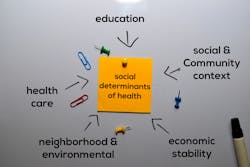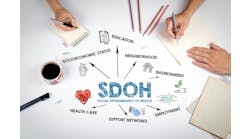The Social Interventions Research & Evaluation Network (SIREN) based at the University of California San Francisco is hosting a series of biweekly discussions delving into issues around social risk screening, including better understanding patient and family perspectives.
A lot of the focus in population health efforts has been on aligning incentives in the healthcare system to give resources to clinicians to ask patients about social determinants routinely and provide links with community-based organizations that offer food, housing and transportation services. But having your family doctor or a pediatrician ask very sensitive questions can be off-putting for patients who don’t know what is going to happen with the data.
In a Feb. 19 SIREN conversation, David Schleifer, Ph.D., vice president and director of research at Public Agenda, a New York-based nonprofit organization that helps diverse leaders and citizens navigate divisive, complex issues, and Elena Byhoff, M.D., an assistant professor in the Department of Medicine at Tufts Medical Center and Tufts University School of Medicine, whose research focuses on how social determinants of health impact health and health care, spoke about their research projects.
Schleifer’s organization did focus groups asking people how they would feel about their family pediatrician asking about social issues. First, they asked people about issues that affect their children's health, and people mentioned nutrition, education, the safety of their neighborhood, environmental issues, and how well they get along with their spouse or partner. “We asked them to think about those issues and where they would go for help with them, and their pediatricians did not come up,” Schleifer said. When the focus group leaders told them that pediatricians are starting to engage with parents on these questions, they had concerns. “People wonder where this information is going to go, and are they really going to be able to actually offer me help?” People are concerned that if they are honest and say I need help with my rent or my spouse has a substance use issue, they're worried that that would cause the pediatrician to call child welfare. That was a big concern.”
Byhoff has worked on research that interviewed patients about their perceptions after they had just gone through a social risk screening. She said they saw high rates of positive responses to clinicians asking these questions. “When we asked patients to dive into why is it acceptable, we had people say, ‘I'm glad you're asking me about food insecurity because actually it is hard for me to make ends meet every month, or thank you for asking about housing because it is the most expensive part of my monthly budget and I can't afford it,’” she said. “So there is an ability to make the connection where you're asking about things that are relevant and important in the moment and not in just some abstract way.”
One issue that researchers raise is whether it is worth it to engage in these social needs conversations if the healthcare team doesn’t have solutions to offer. Among the parents Schleifer’s group interviewed, there was tension on this question, he said. “There was a sense that there has to be some kind of help. There may be patients who feel like there's a double loss — that's what we call it — you say you need help and then you don't get it, so then you've lost twice. My sense is that there should be some kind of help, but I wouldn't want that to be an excuse for not trying to engage in these conversations.”
Byhoff said she thinks it is an important aspect of the screening that it's not just to address the unmet need, but to also think about it as a whole person care plan. “We want to know if you don’t have housing or if you can't afford your meds,” she said. “How can we adjust our care plan to better address your needs, based on any sort of unmet social concerns that you have?"
Racism, discrimination, and social risk screening
Another conversation, between Toyin Ajayi, M.D., and Monica Peek, M.D., M.P.H., on Feb. 5, focused on the intersection of racism, discrimination, and social risk screening in clinical settings.
Ajayi, a family medicine physician, is chief health officer and co-founder of Cityblock Health, a technology-driven provider for communities with complex health and social needs. Peek is an associate professor of medicine at the University of Chicago and director of the Chicago Center for Diabetes Translational Research.
Ajayi asked Peek to describe the experience of a person of color encountering primary care and experiencing a screening for something that's sensitive and personal. What does that feel like for a person of color in their primary care office?
“I think that for anyone it can feel intrusive,” Peek said. “But for people who are structurally marginalized, there can be an additional layer, where we're not sure why people are asking a question. We know that there is a history where sometimes the answer to those questions can lead to things like children being taken out of our homes. Just as with the national conversation recently around vaccine hesitancy, structurally marginalized populations have these layered levels of mistrust with government institutions and many other non-government institutions, including healthcare systems. We have to think about those contexts when we're asking very personal questions,” she said.
“When we ask about material needs insecurities that impact their health, we have to figure out how to weave those two things together,” Peek continued. “We have to recognize that we can't just dive in there in broken spaces; we have to be able to engage people and communities in places in ways that feel trusted and safe. I think that's part of the challenge that lies ahead of us — what are the ways in which we can rebuild our healthcare systems? Who are the right people to put in place to be able to ask those questions? How can we create these safe spaces, so that when we do ask these very personal questions, people feel like they can be honest with the answers, that they can feel assured that there's going to be a positive and affirmative response that is going to make their life better, as a result of them answering those questions.”
Ajayi said there is a tension felt among healthcare providers and health service researchers. “We believe that data and information about what's going on for our patients in our communities is powerful, because it allows us in the ideal state to care for them differently and better,” she said. She said Cityblock is all about asking these really intimate questions to gain information that help better serve the people they’re caring for. “But we know that our system is rife with bias and with racism, and that the reasons why people may be mistrustful are not unfounded. Have we earned the right to even have this information? And if not, are there other steps we should be taking?”
Screening at scale
In a Jan. 22 SIREN discussion, Anand Shah, M.D., vice president of social care at Kaiser Permanente, spoke about scaling social risk screening with Stacy Lindau, M.D., a professor at the University of Chicago and the founder and chief innovation officer of NowPow LLC, a technology company that connects healthcare providers and community-based organizations.
Landau said an “asset-based approach” is essential to scaling social risk screening. “I believe in not just understanding what people’s needs or deficits are, but also what their assets are, and that makes it easier to have a conversation that otherwise, not done right, could be stigmatizing.”
When screening goes well, “it feels intuitive,” Shah said. It’s part of the conversation. It’s easy for the patient and the clinician to engage in a way that feels respectful for both parties and doesn’t add extra work,” he added. “We all know so many of these things don’t go that way routinely, especially when we try to make it more systematic and scale them. That’s the tension so many of us are feeling.”
Lindau also stressed the important role technology can play. “We have to recognize that there’s an opportunity cost to everything we do. If we implement a 20-minute screening protocol, that’s 20 minutes of somebody’s time that’s not being spent doing something else.” Technology can help clinicians connect the dots between assessment and assistance, and do it at scale, she said.
Upcoming sessions of the SIREN Coffee & Science Conversations:
• March 5: “Building Accountability for Social Risk Screening into State Medicaid Programs” – Sarah Desilvey, DNP, FNP-C and Michael Bailit, MBA
• March 19: “Social Risks vs. Social Needs: Assessing Patients' Interest in Assistance” – Minal Patel, PhD, MPH and Emilia De Marchis, MD, MAS


